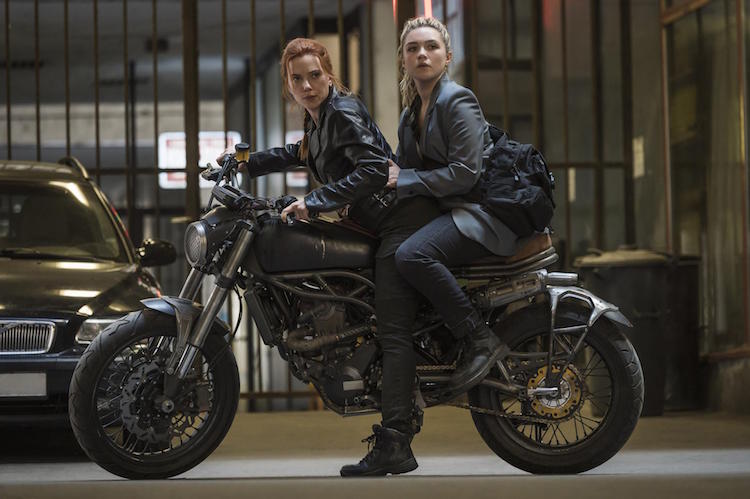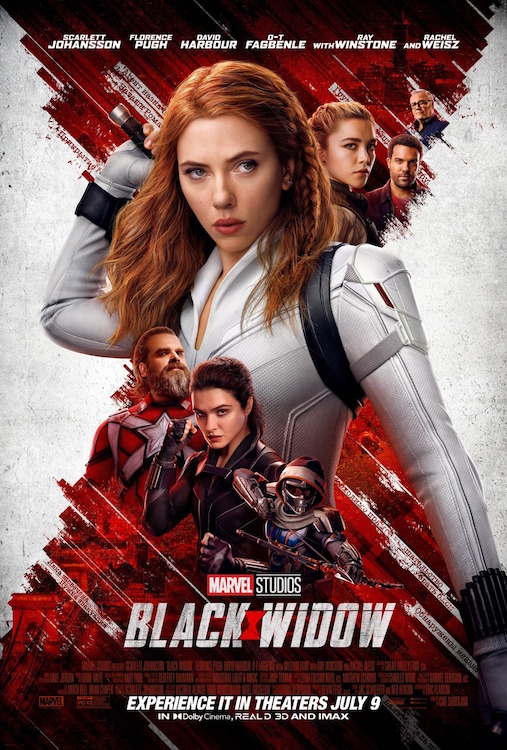Sandwiched between the events depicted in Captain American: Civil War (2016) and Avengers: Infinity War (2018), the new Marvel film, Black Widow, follows Natasha Romanoff (Scarlett Johansson) as she attempts to clear some of the dark marks in her ledger after being drawn back into her life as a trained assassin. Ultimately, the film plays as a fine entry to the Marvel canon and proves that super heroines can hold their own every bit as well as their male counterparts.
The film begins with a prologue of sorts in 1995 when Natasha is a pre-teen living with her former faux family—father, mother, and sister—who are forced to flee their idyllic suburban life once their uncover mission is compromised. Years later, after serving time as an Avenger, Natasha is reunited with her sister (Florence Pugh), mother (Rachel Weisz), and father (David Harbour) as they reunite in an attempt to take down the sinister Dreykov (Ray Winstone) who is attempting to build an entire army of brainwashed Black Widows.
Director Cate Shortland does a wonderful job of executing Black Widow’s first independent adventure away from the Avengers. As scripted by Eric Pearson (Godzilla vs. Kong [2021] and Thor: Ragnarok [2017]), the film plays as though it is the female-led reboot of the James Bond franchise that has been teased off and on over the years. In fact, Black Widow feels more like a spy thriller than a comic-book film throughout most of its two-hour plus running time than the typical super-hero film, if that is a distinction that speaks in some way to you. The choice of going that route with the style of the film benefits it in that it gives the character a genuinely creative and original entry into the Marvel Cinematic Universe instead of simply something more assembly-line produced. It also helps that there is rarely a moment when the action lets up save for the occasional insertion of something genuinely funny, such as Yelena (Natasha’s sister) claiming that her sister is such a “poser” after witnessing Natasha coming out of particularly harrowing fight to freeze in her classic Black Widow stance. Which, again, one might consider an echo of the spy-thriller angle hinted at earlier.

Scarlett Johansson and Florence Pugh in “Black Widow.” Photo by Jay Maidment – © Marvel Studios 2021. All Rights Reserved.
Similarly, both the editing (by Leigh Folsom Boyd) and cinematography (courtesy Gabriel Beristain) of the film lends itself to more of gritty take than the typical Marvel film. That is not to say that the film is steeped in realistic displays of action or the like. This is a super-hero movie after all, but there is an earnestness at work throughout that makes Black Widow feel more like a labor of love than a concerted attempt to create a blockbuster franchise and that allows the film to resonate a bit more than perhaps it would otherwise.

| Producer: | Kevin Feige |
| Release Date: | July 9, 2021 in theaters and on Disney+ |
| Running Time: | 133 minutes |
| Starring: | Scarlett Johansson, Florence Pugh, David Harbour, Rachel Weisz, Ray Winstone, O.T. Fagbenle, Olivier Richters |
| User Rating: | |
| Writer: | Eric Pearson |
| MPAA Rating: | PG-13 (for intense sequences of violence/action, some language and thematic material) |
| Director: | Cate Shortland |
| Distributor: | Marvel Studios |
| External Info: | Official Site / Facebook / Twitter / Instagram |

